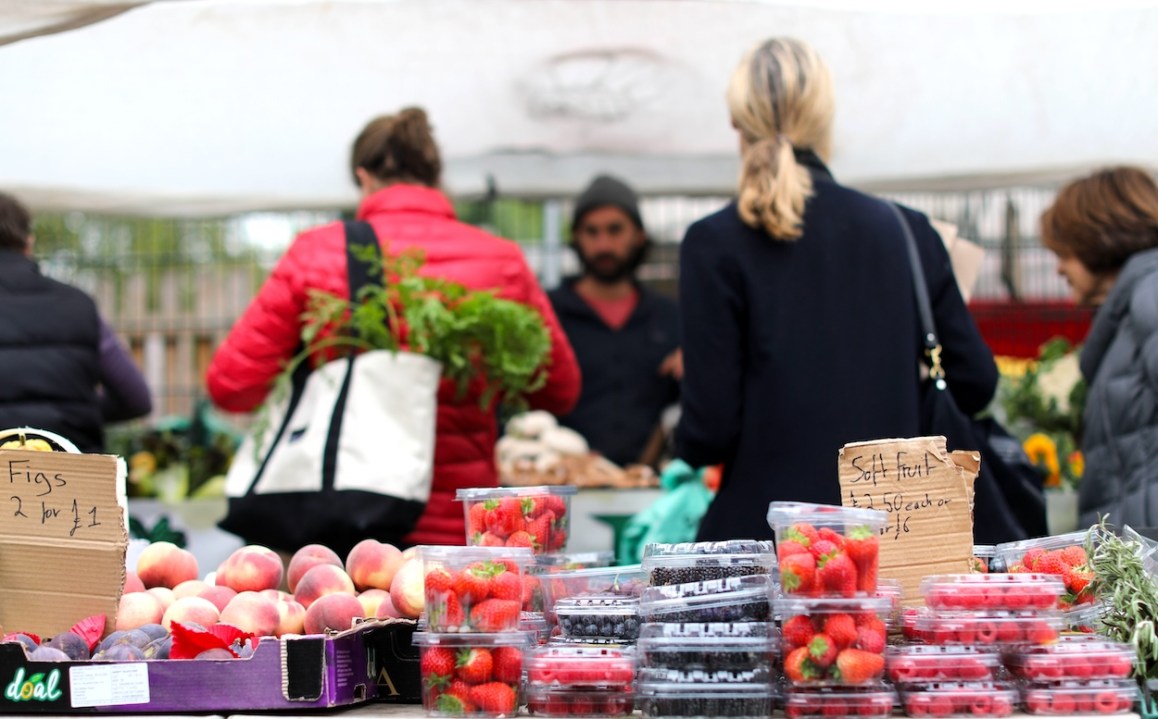Farmer’s markets are a very cheeky wheeze and we all know it. Their promise – getting back to peasants’ basics of veg yanked from the ground – carries a hefty premium compared to supermarket food, which actual peasants have to buy. Indeed, supermarket food, from veg and fruit to eggs and cheese and bread, is generally two or three times cheaper and tastes just as good.
But it seems that we are already in a world so dystopian that only the rich want – and can afford – soily spinach sold loose on a table. Certainly, the rich will queue for sorrel and strawberries, yoghurt and kimchi, raw milk, chicken and sourdough. Especially the sourdough. Carbs used to be bad, but now the queue outside places such as Lannan in Edinburgh is so long that the bakery has had to employ bouncers to control it.
At the mouth of the Queens Park farmers’ market in north-west London – one of the most Instagrammed north of the river – is Don’t Tell Dad, a sprawling café with sourdough loaves and circular candied hazelnut croissants. These generate queues along the pretty cobbled road that are so off-putting that I will only go when it’s pouring with rain and nobody’s out. The sourdough at Dusty Knuckle in Hackney has to be booked well in advance. Pastry and bread is the treat that leavens the purchase of greens; so very many greens.
My thinking about markets has been shaped by travel. I have realised I hate foreign food markets. I always went because the internet said I had to and because the cosmopolitan middle-class milieu I inhabit has a reverence for local produce that is hard to override, even with cynicism and empty pockets.
The worst of my life were the markets in Sicily and Jerusalem. Palermo left me traumatised; tourists are baited and mocked as they timorously look at this or that vendor’s mound of veg. I came away with some tiny bag of exotic olives for €10 that should have cost €1, feeling a pathetic fool. I have even seen native Italian speakers ripped off in Sicilian markets. Sellers demand that customers speak the dialect or else face bald exploitation. It seems a bad sales strategy. And yet, so slavishly do we want what these scoundrels are selling – or rather what they represent – that it doesn’t seem to do them much harm.
Compared to the incomprehensible shouts of Mediterranean hawkers, the English farmers’ market is, of course, a blessed relief. At least I speak the language and don’t have to conjure the price of a third of a kilo of sardines while a greasy man is shouting at me. There is no shouting, no bargaining and no vernacular. Many of the people at the stalls aren’t even English.
The other great insult of the market, the sheer cost, has lessened over the past few years. Since the cost of living has shot up, the gap between the prices of greenery, eggs and fruit at the farmers’ and the supermarket has narrowed. On my most recent visit to the former, I fell for a rather wilted bunch of coriander for £2 (compared to 90p in Waitrose), and £2 for a small bunch of spinach, but the strawberries – decking every table as far as the eye could see – were quite good value, at two punnets for £5. These velvety strawbs were superior by far to Waitrose’s best organic efforts at £4 (an admittedly slightly heavier punnet).
I have always found the idea of seasonal cooking imprisoning
Then there are the health considerations. As I have got older, and pore over articles and videos about microplastics and forever chemicals, the farmers’ market has a new appeal. If I buy my vegetables in brown paper bags and eat things that haven’t been sprayed too much, perhaps they will be better for me.
I have always found the idea of seasonal cooking imprisoning; surely one of the glories of late modern capitalism is that we have become free of nature’s strictures, and can eat pineapple and avocado and coconuts all year round. Why should I limit myself to courgette and asparagus in spring, tomatoes in August and apples in autumn? Why go gaga over gooseberries for two weeks in June? It’s like going to bed when the sun sets and getting up when it rises. No thank you.
Seasonal veg remains of little interest to me (is there really a difference in taste between a Spanish courgette in January and a Kentish one in May?), but seasonal fruit, I now admit, is delicious, even if it’s of the provincial English type. Once you accept the homegrown tastes of dark red stone-fruit after the exotica that our globalised palates are used to, you can begin to enjoy the fruits, if not the cost, of shopping at the farmers’ market.








Comments